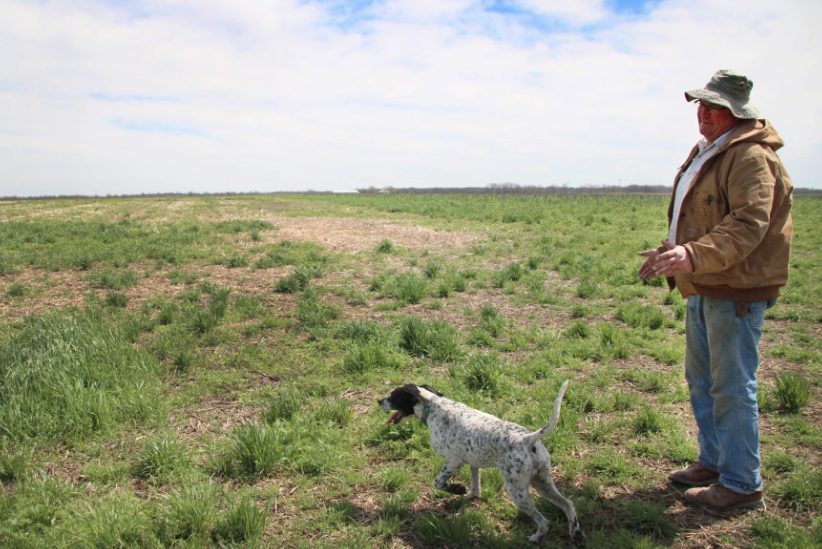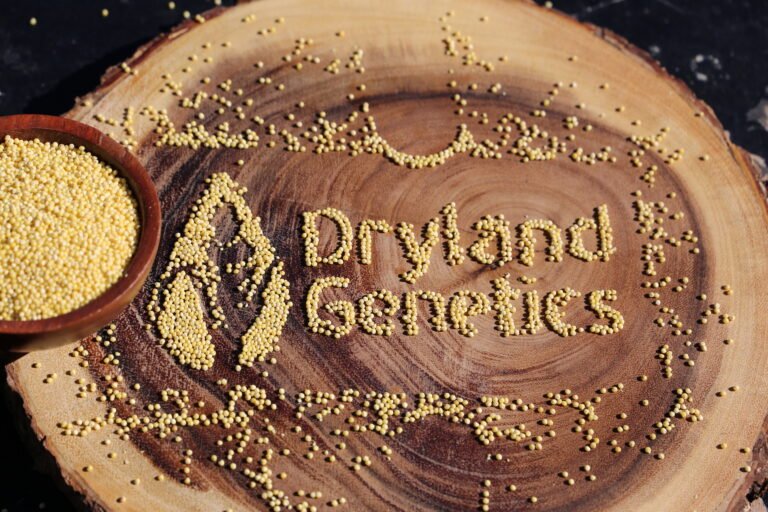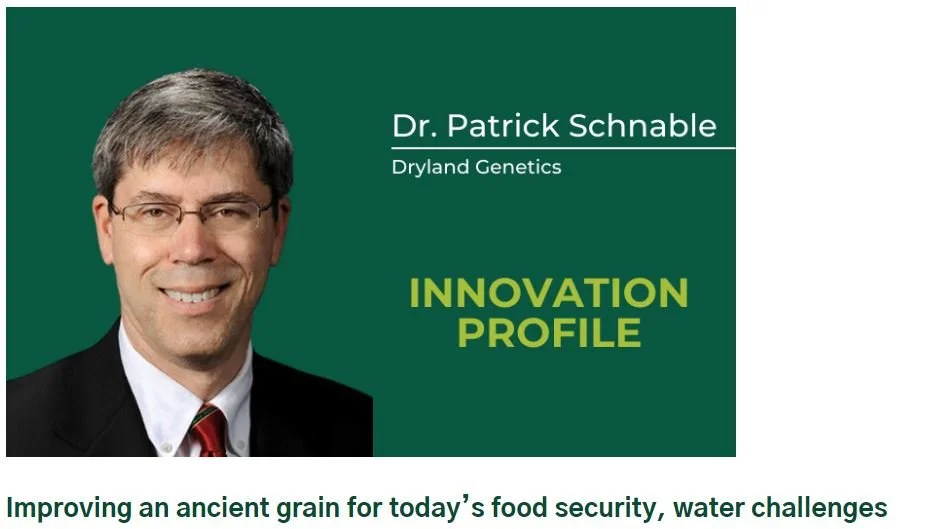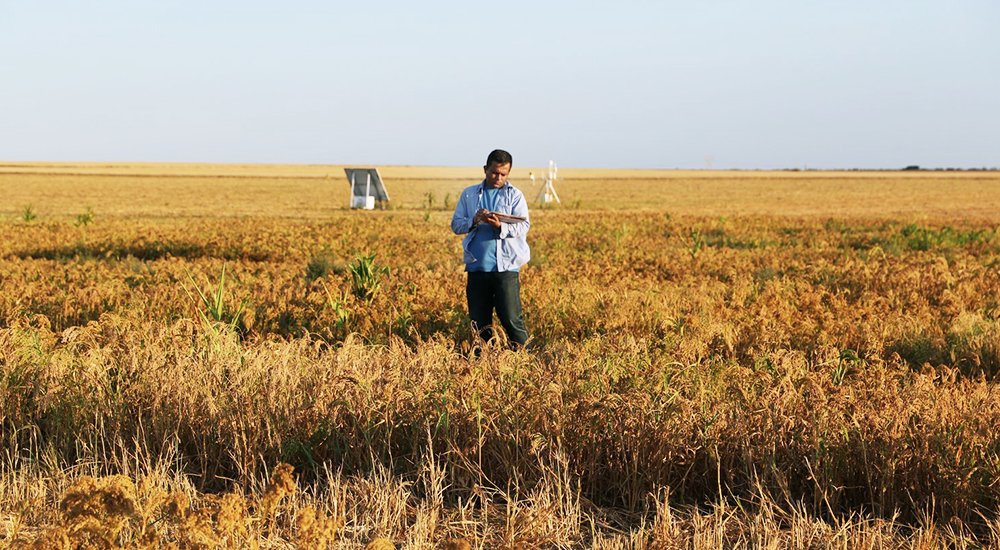
Innovators of Iowa State: A Third Crop for Iowa?
A greenhouse discovery could lead to proso millet being considered the third most important crop for Iowa farmers. Iowa State University visits with Dr. Patrick Schnable to learn how Dryland Genetics could impact the future of agriculture with this extremely water-efficient crop.

Ag Expert Sees Proso Millet as Iowa’s Crop of the Future
Radio Iowa visits with Dr. Pat Schnable to hear how proso millet could be the next big crop for Iowa farmers looking for a more resilient, sustainable and profitable grain.

Ancient Drought Resistant Grain Could Help The Midwest Survive Climate Change
NPR/Harvest Public Media Shares how farmers in the midwest have been using proso millet including highlights from Dryland Genetics and their breeding program plus hearing from Iowa farmer and Dryland Genetics Board of Director, Jeff Taylor.

Scientist develops new crop genetics for food and profit.
This climate-conscious proso millet has the ability to produce twice as much grain per inch of water as corn. Learn more about it's potential impact on hunger and future impact on the food supply.

BioNebraska Spotlights Dryland Genetics Industry Contribution
Learn how Dryland Genetics, a member of BioNebraska is advancing the potential of proso millet.

Dryland Genetics Featured on Future of Agriculture Podcast
Dryland Genetics had the opportunity to share more with Tim Hammerich on his podcast about the work we have been doing with our genetics and the impact this crop could have on the future of agriculture.

Innovation Profile: Dr. Patrick Schnable, CEO Dryland Genetics
As drought conditions persist across the nation, the ancient grain of proso millet provides a sustainable solution for farming in drier climates where other crops struggle or fail. Here's how Dryland Genetics is filling that pipeline with modern proso millet genetics.

Dryland Genetics CCO featured on “Regenerative by Design” podcast.
Tune into the "Regenerative by Design" podcast and learn the potential impact proso millet could have on water conservation efforts and the grain industry as a whole.

Ames Company Turns to Ancient Grain to Fight Food Insecurity
As prime agricultural land is being turned into developments, many farmers across the nation are being forced to produce more grain with fewer acres. The climate-conscious, sustainable proso millet is able to produce twice as much grain per inch of water as corn. Learn more about its impact.

New Level Ventures Investing in Dryland Genetics
Today's supply chain obstacles have put pressure on nearly every industry in every corner of the world. With changing climate and weather patterns, it's essential for our food system to depend on sustainable and resilient food supplies - like proso millet.
Farm Radio Interview with Dryland Genetics Co-Founder, Dr. James Schnable, on 1010 KSIR
Dryland Genetics co-founder, James Schnables speaks with Lorrie Boyer of KSIR about breeding a new variety of proso millet, what lead to understanding the need of new genetics for this crop.
New Proso Millet Varieties Significantly Boost Yields on Non-irrigated Acres, Even with No Fertilizer Use
Proso millet, a crop that makes more grain from less water than any other, has been neglected by the seed industry for many years. But that is starting to change. In the summer of 2021 farmers across the state of Colorado had the chance to try seed of two new varieties of proso millet, DLG 40 and DLG 240, developed by Dryland Genetics, founded by scientists from the University of Nebraska-Lincoln and Iowa State University.

U.S. Secretary of Agriculture and Mexican Agriculture and Rural Development Minister Examine Proso Millet Seed
U.S. Secretary of Agriculture, Tom Vilsack and the Mexican Agriculture (right) and Rural Development minister, Víctor Manuel Villalobos Arámbula (left) examining proso millet seeds after being briefed about Dryland Genetics.
Proso Millet Continues to Define its Niche on the High Plains
In an age of climate change, proso millet is a grain that can endure the scorching summer heat and drought. That’s why Colorado farmer Chris Stum went from planting mostly wheat and corn to putting over half of his acres to millet and finding markets to sell it.
Dryland Genetics Raises 3.8 Million
Dryland Genetics announced it raised $3.8 million in venture financing as part of a round led by Next Level Ventures, of Des Moines and Stine Seed Farm, of Adel, with additional investment coming from the company’s existing investors.
Dryland Genetics May Be the Answer When Farmers Are Looking for Every Drop to Count
This story from High Plains Journal talks about the stress of drought on Kansas farmers. On the left side bar, James Schnable talks about proso and how it can impact areas with little rainfall.
